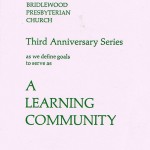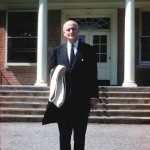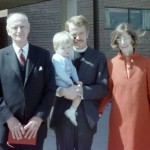This past Wednesday, 19 January, the day of his death, I paused to remember a man who had a dramatic impact on my life: Frank Ely Gaebelein (1899-1983). Dr Gaebelein, Headmaster of Stony Brook School for forty-one years, died at the Mayo Clinic in Rochester, Minnesota, on that date in 1983. When I was deposited in September 1953 at “the Brook” straight from the mission field by my father (who had taught there 1923-1924), FEG was on sabbatical and Pierson Curtis was in charge. The legendary “PC” and I simply did not click: probably the only one in the School of whom that can be said. When FEG returned in 1954 he took an immediate interest in me and made me. for my final year, his aide-de-camp, sitting in the Office guarding his door at nights. His Romans class was the intellectual highlight of my two years at Stony Brook: careful exposition of Scripture and brilliantly applied. My senior assignment was a paper on the inspiration of Scripture and the recommended text was Francis Lindley Patton’s classic. Patton had spoken at the opening of the School in 1922 and was at that time President of Princeton Seminary. I came to FEG with my valedictory speech. He went over with me the outline, four words starting with “S,” and told me to strike out one, “Sex.”
My first year at McGill University – FEG had battled my father who made me turn down a full scholarship to Harvard so I would be sure to keep the faith under the watchful eye of Stanford Reid at McGill – was a disaster. I describe my trauma in C Stacey Woods and the Evangelical Rediscovery of the University (154-5). In my despair I traveled back to Stony Brook, and spent time with him. He wrote my uncle Wesley Ingles, a former teacher, “I am concerned about Don MacLeod … Don has been in to talk with me … It is too bad to see [him] … at such a loose end.” (FEG to JWI, 13 Sept 1956 SBS Archives) Others may have found FEG aloof but to me he was a warmhearted pastor. Three years later, graduating from McGill, I made my way back for graduation to show him that I had navigated the shoals of adolescence successfully.
I have a full file of Gaebelein letters over the next decade that I cherish. What a correspondent he was: always encouraging me to stay the course, to remain strongly Biblical in the early days of ministry, to keep the faith. I started a church in suburban Toronto in 1967 and invited him to lead a weekend with my fledgling congregation over Easter 1971. How he managed to be away from home over that holiday escapes me and his utter humility in coming. We kept him busy with various events climaxing with a memorable message Resurrection Morning, “The Imperative of Christian Education.” The brochure speaks of his “continuous contact with youth [which] has given Dr.  Gaebelein a unique combination of the wisdom and perspective of age with the freshness and dynamism of the innovator.” He left me one of his books inscribed to “my former student, in whose faithful ministry of Christ and the Word I greatly rejoice.”
Gaebelein a unique combination of the wisdom and perspective of age with the freshness and dynamism of the innovator.” He left me one of his books inscribed to “my former student, in whose faithful ministry of Christ and the Word I greatly rejoice.”
In March 1980, returning from a school break in Florida, we dropped in at his home in Arlington, Virginia, as I wanted my boys to meet him. We spoke briefly, left a plant, and expressed concern. Dorothy Gaebelein was upstairs in the final stage of her illness. It was a difficult time for him and, after prayer together, we continued on our journey home with a heavy heart. My final memory of FEG was at the Evangelical Theological Society when it met in Toronto at Ontario Bible College and Theological Seminary, as Tyndale was then known, in November 1981. I drove him out to the Airport to catch a plane back to Washington. He only lived another fourteen months but I see him still, going out through Departures, alone.
FEG was a cultured man of strong convictions, stalwart faith, and iron discipline. Stony Brook was his monument. He prepared me for life. I see in my notes from his Romans class ,which I still use, he said “The fellowship among believers is one of the benefits of a place like Stony Brook … That is something that we who are going to secular colleges will miss.” I have one of his mountain photographs framed in a prominent place in my home, a constant reminder of FEG. The obituary of a Swiss mountain climber comes to mind when I think lovingly of Frank Ely Gaebelein: “He died climbing.”


